Introduction
This report has been prepared by the SSM Network of Enforcement and Sanctions Experts to present comprehensive statistics on the sanctioning activities in relation to breaches of prudential requirements carried out in 2020 by the ECB and the national competent authorities (NCAs) of participating Member States under the Single Supervisory Mechanism (SSM).[1]
The activities covered in the report include the conduct of formal sanctioning proceedings by the competent authorities within the scope of their respective powers,[2] in particular the imposition of administrative penalties for breaches of prudential requirements by supervised entities (groups) or other legal or natural persons, which fall under the scope of prudential supervision in the context of the SSM.[3]
The statistics are presented in aggregate for the whole SSM. Data were therefore collected and compiled along standardised categories to ensure the harmonisation and meaningful comparability of the information related to the sanctioning activities conducted by the ECB and the NCAs.[4]
Main findings
The focus of the formal sanctioning proceedings conducted and penalties imposed in the SSM in 2020 by the competent authorities was mainly on breaches of prudential requirements[5] in the area of internal governance, which remained in line with the SSM Supervisory Priorities 2020 in respect of the general objective of further improvements in banks’ governance framework. This was combined with the competent authorities’ material sanctioning activities as regards infringements related to supervisory reporting.
A rise in the pursuit of breaches committed in other areas of prudential supervision, i.e. large exposures and liquidity (in terms of the number of proceedings conducted) and capital requirements and qualifying holdings (in terms of the penalties imposed) was observed in 2020.
Overall, 100 administrative penalties were imposed in 2020 by competent authorities within the SSM on persons responsible for breaches of prudential requirements. These were mainly pecuniary penalties (57%) for the total aggregate amount of around €12.15 million. The highest pecuniary penalty in 2020 was imposed on a significant institution[6] (SI) and amounted to €4.6 million. As regards other types of person sanctioned in 2020, the highest pecuniary penalties were as follows: less significant institutions (LSIs) €2.5 million; other legal persons falling within the remit of the competent authorities’ sanctioning activities €250,000; and natural persons €186,000. The remaining 43% of penalties were of a non-pecuniary nature.
The sanctioning activities concerned predominantly LSIs, which represented 42% of all proceedings conducted and 59% of all administrative penalties imposed. However, at the end of 2020, the focus in terms of the number of the proceedings ongoing started to shift towards natural persons.
Based on statistics on the formal proceedings ongoing at the end of 2020, it is anticipated that governance will remain in the spotlight of the sanctioning activities within the SSM, all the more so as governance is one of the SSM Supervisory Priorities 2021.
Sanctioning proceedings conducted in the SSM in 2020
Overall figures
At the beginning of 2020, 262 formal sanctioning proceedings were actively being conducted by the competent authorities within the SSM (Table A). Of those proceedings, 41 were opened in previous years by NCAs acting on the ECB’s request addressed to them pursuant to Article 18(5) of the SSM Regulation.[7] In addition, 169 new formal sanctioning proceedings were opened during 2020.
Table A
General information on formal sanctioning proceedings conducted in 2020
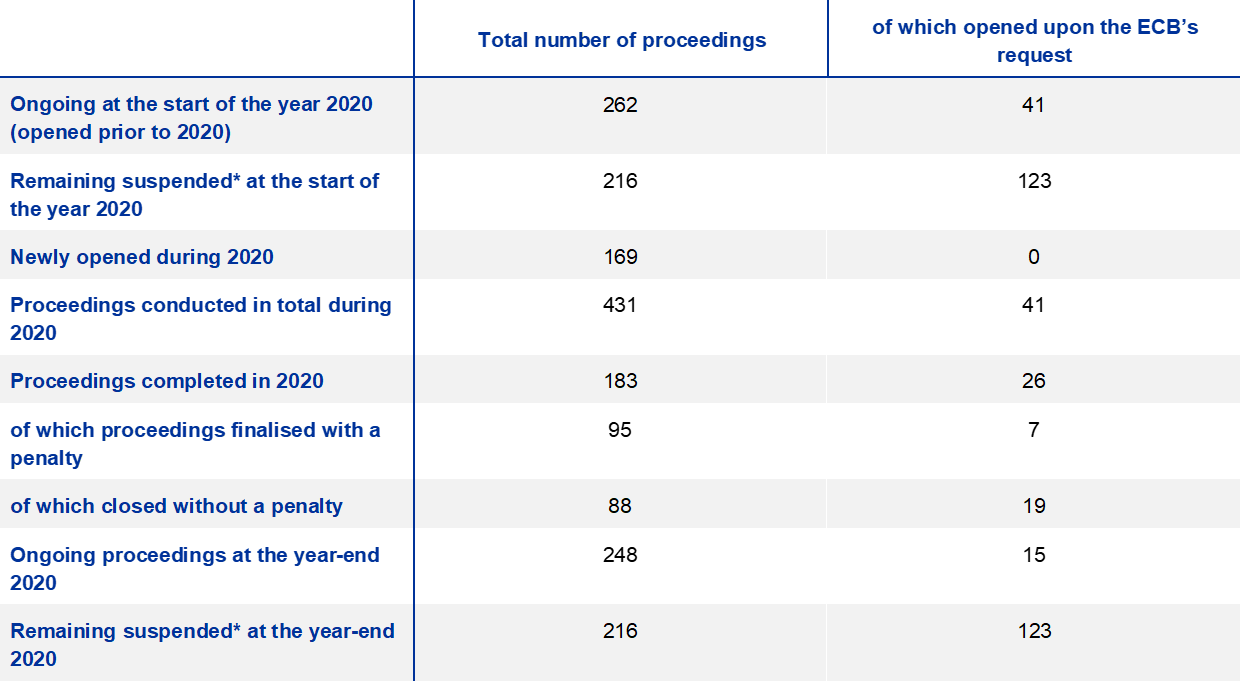
*The proceedings were suspended due to criminal proceedings pending before national courts against the same person(s) in connection with the same facts.
Consequently, together with the proceedings ongoing at the beginning of 2020, the competent authorities comprising the SSM conducted in total 431 formal sanctioning proceedings during that year.
Of the 431 proceedings conducted, the highest number related to breaches in the following areas of prudential supervision: internal governance (45.5%), reporting (19%), large exposures (5%) and liquidity requirements (4.5%).
Chart 1 presents a breakdown of the proceedings conducted in 2020 by area of infringement.
Chart 1
Formal sanctioning proceedings conducted in 2020 by area of infringement
(percentages)
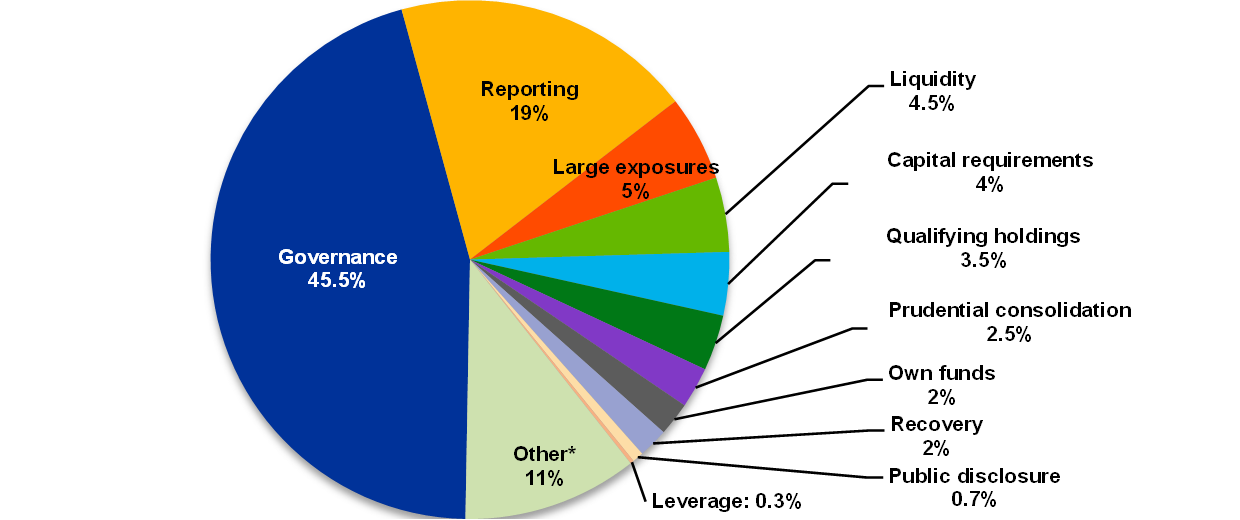
* In 2020 the category “Other” consisted of breaches concerning (i) carrying out the business of taking deposits or other repayable funds from the public without being a credit institution; and (ii) credit institutions performing activities not permitted for credit institutions.
Within the area of internal governance, the sanctioning proceedings conducted in 2020 were related predominantly to risk management and internal controls, as well as organisational requirements (including with regard to management body functions and committees) applicable to the supervised entities.
As regards the types of person subject to proceedings, of the 431 proceedings conducted in 2020, 42% concerned LSIs, while 36% concerned natural persons (potentially) responsible for committing the breaches of prudential requirements.[8]
A further 12% of all proceedings conducted in 2020 concerned SIs. The remaining 10% concerned other legal persons falling within the remit of the competent authorities’ sanctioning activities.
Chart 2 presents a breakdown of the proceedings conducted in 2020 by type of person concerned.
Chart 2
Number of formal sanctioning proceedings conducted in 2020 by type of person concerned
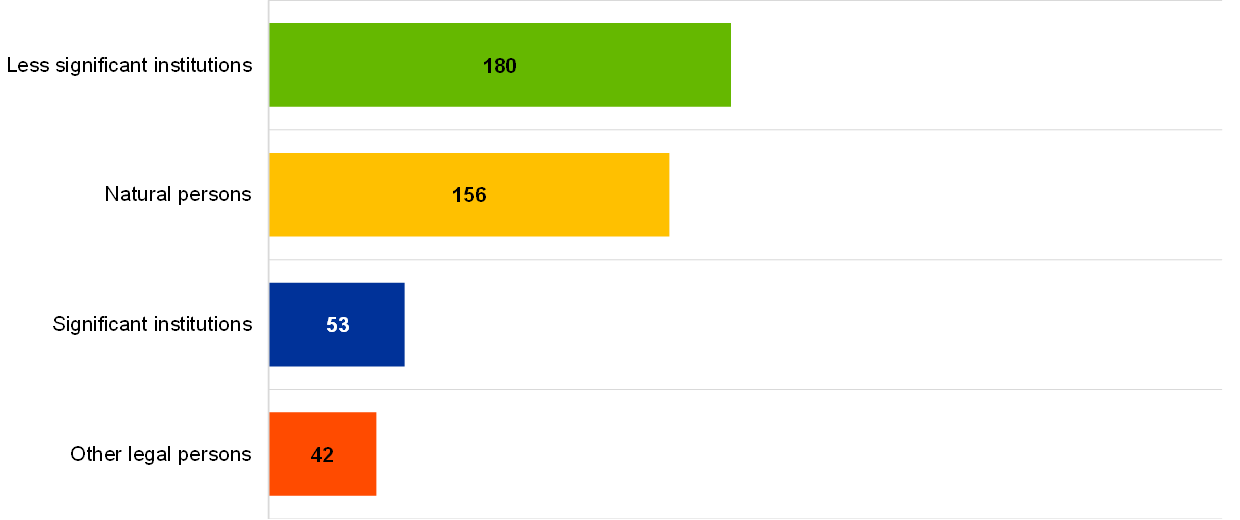
Proceedings completed by the year-end
During 2020, 183 formal sanctioning proceedings were completed (i.e. 42% of the total proceedings conducted) with the outcome of a decision either to impose a penalty or to close the proceedings without imposing any penalty (Table A and Chart 3).
Chart 3
Outcome of formal sanctioning proceedings conducted in 2020
(percentages)
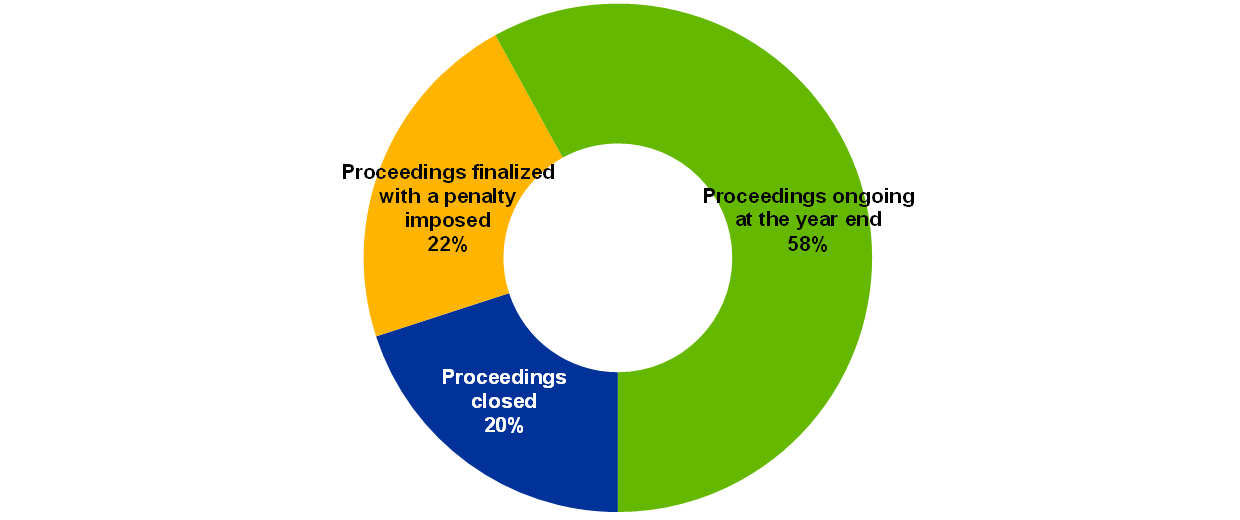
See Section 3 for further information on the proceedings finalised with a penalty.
Out of the 183 proceedings completed during 2020, 88 proceedings (i.e. 20% of the total proceedings conducted) were closed[9] without a penalty being imposed, mainly because, after closer assessment, it was concluded that no breach had been committed (65% of the proceedings closed without a penalty). This underlines the importance of carrying out a comprehensive investigation, as well as the challenges related to thorough fact-finding in sanctioning proceedings in the area of prudential supervision.
The second most common reason for closure was the absence of a sufficient degree of severity of the (alleged) breach (28% of the proceedings closed without a penalty), which in some participating Member States may also be affected by policy considerations taken into account by the national legislator and the respective competent authority in deciding which infringements should be pursued.
Other reasons for closing the proceedings were the lack of relevant legal basis (in 3.5% of the proceedings closed without a penalty) and various other grounds (in the remaining 3.5% of the proceedings closed without a penalty).
The majority of the proceedings closed without a penalty referred to (alleged) breaches in the following areas of prudential supervision: reporting (38%), internal governance (25%) and large exposures (14%).
Proceedings ongoing and remaining suspended at the year-end
At the end of 2020, 248 formal sanctioning proceedings (58% of the total proceedings conducted) were actively being conducted, of which 15 proceedings were opened by NCAs at the ECB’s request addressed to them in previous years pursuant to Article 18(5) of the SSM Regulation.
The majority of the proceedings ongoing at the end of 2020 related to suspected breaches committed in the following areas of prudential supervision: internal governance (56%), liquidity requirements (8%), qualifying holdings (4%) and reporting (4%).
In addition, 216 proceedings remained suspended throughout the year until its end (123 of these proceedings were opened by NCAs at the ECB’s request addressed to them in previous years pursuant to Article 18(5) of the SSM Regulation).[10]
Administrative penalties imposed in 2020
Overall figures
Out of the 183 formal sanctioning proceedings completed in 2020, 95 proceedings (22% of the total proceedings conducted) resulted in 100 administrative penalties in total (57 pecuniary and 43 non-pecuniary) being imposed on persons held responsible for various breaches of prudential requirements. Of those penalties, 14 were imposed in 7 proceedings opened by NCAs at the ECB’s request addressed to them in previous years pursuant to Article 18(5) of the SSM Regulation.
Chart 4 presents an overview of the administrative penalties imposed by competent authorities in 2020 for breaches of prudential requirements.
Chart 4
Administrative penalties imposed by competent authorities in 2020
(percentages)
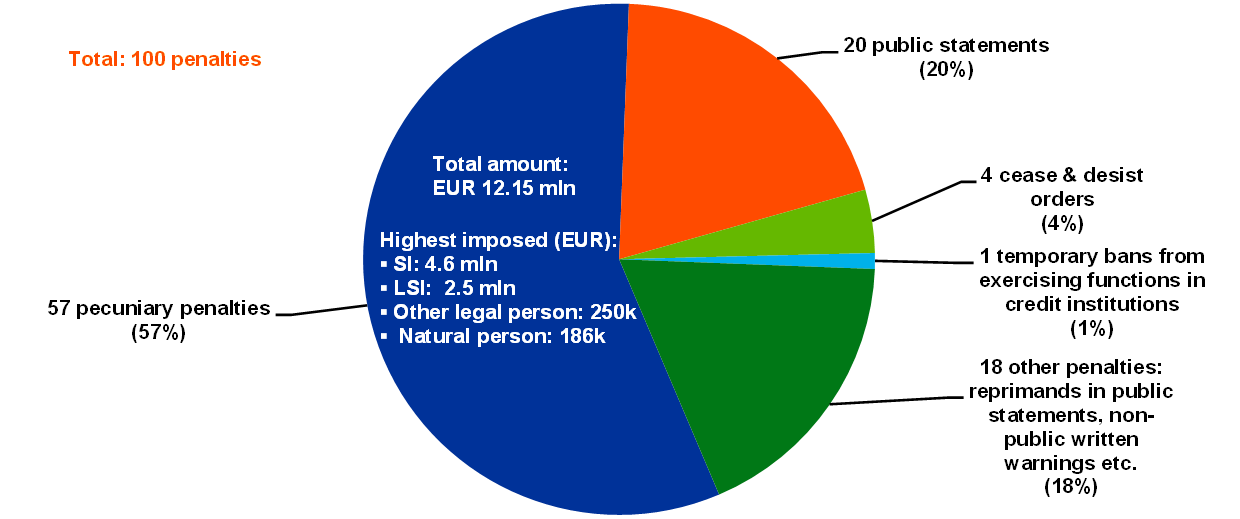
Most of the administrative penalties were imposed with regard to breaches committed in the following areas of prudential supervision: internal governance (39%), reporting (33%), capital requirements (5%) and qualifying holdings (5%).
Chart 5 presents a breakdown of the breaches sanctioned with an administrative penalty in 2020 by area of infringement.
Chart 5
Administrative penalties imposed in 2020 by area of infringement
(percentages)
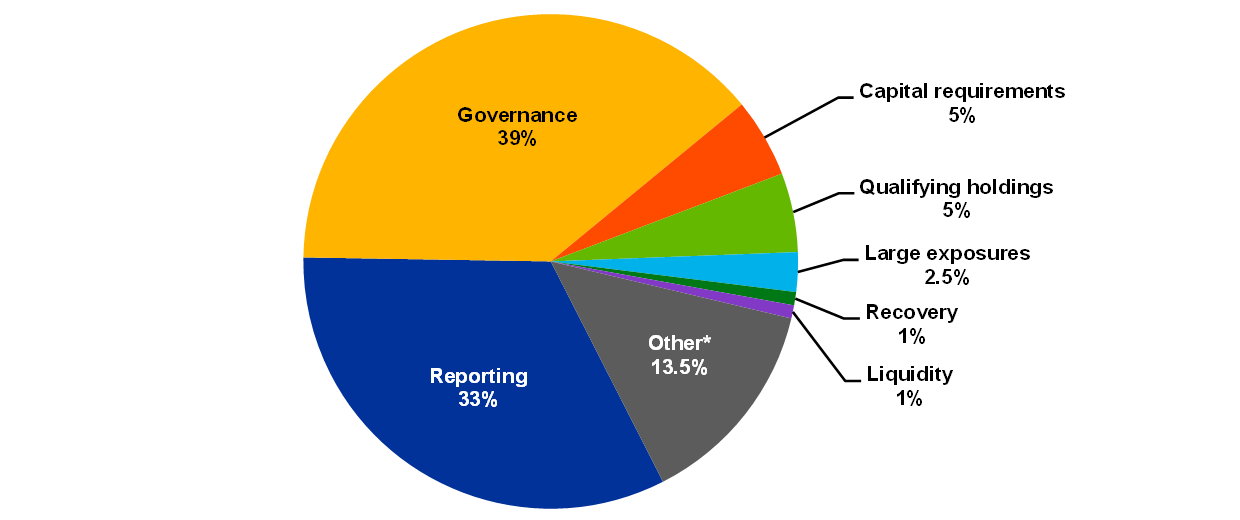
*In 2020 the category “Other” consisted of breaches concerning (i) carrying out the business of taking deposits or other repayable funds from the public without being a credit institution; and (ii) credit institutions performing activities not permitted for credit institutions.
Within the area of internal governance, the proceedings finalised with a penalty being imposed related mainly to risk management and internal controls.
In terms of the types of person sanctioned, out of the 95 proceedings where an administrative penalty was imposed, 56 proceedings (59%) concerned LSIs, 18 proceedings (19%) were related to natural persons responsible for committing the breaches, 11 proceedings (12%) concerned other legal persons falling within the remit of the competent authorities’ sanctioning activities, while the remaining 10 proceedings (10%) related to SIs.
Chart 6 presents a breakdown of the proceedings finalised with an administrative penalty in 2020 by type of person sanctioned.
Chart 6
Number of proceedings finalised with an administrative penalty in 2020 by type of person sanctioned
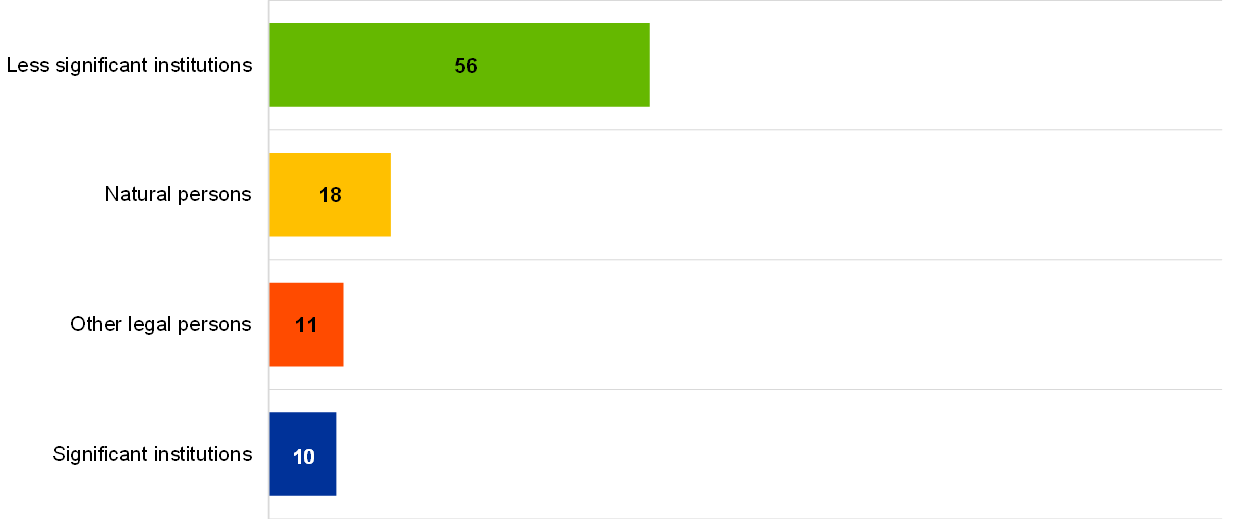
Pecuniary penalties
Out of the 100 administrative penalties imposed in 2020 for breaches of prudential requirements, 57% (57 penalties) were of a pecuniary nature for an overall aggregate amount of around €12.15 million. Among those sanctions, 6 pecuniary penalties totalling €6.8 million were imposed by NCAs in national proceedings opened on the ECB’s request addressed to them in previous years pursuant to Article 18(5) of the SSM Regulation.
The highest pecuniary penalty imposed in 2020 concerned an SI and amounted to €4.6 million. As regards other persons sanctioned in 2020, the highest pecuniary penalties were as follows: LSIs €2.5 million, other legal persons falling within the remit of the competent authorities’ sanctioning activities €250,000, and natural persons €186,000. Most of the pecuniary penalties were related to breaches committed in the following areas of prudential supervision: reporting (45%), internal governance (32%), capital requirements (6.5%) and qualifying holdings (4%).
Other penalties
Besides the pecuniary penalties, the competent authorities also imposed, as an outcome of the formal sanctioning proceedings, 43 non-pecuniary penalties (representing 43% of the total number of administrative penalties imposed). Among those penalties, 8 were imposed by NCAs in national proceedings opened on the ECB’s request addressed to them in previous years pursuant to Article 18(5) of the SSM Regulation.
This category of penalties included in 2020 such measures as public statements; cease and desist orders; temporary bans from exercising functions in credit institutions; and other penalties such as additional reprimands included in public statements, non-public written warnings, and formal instructions to bring the infringement to an end within a specified time limit and to ensure that it is not repeated (sometimes subject to incremental penalty).[11]
Most of those penalties were imposed in relation to breaches committed in the following areas of prudential supervision: internal governance (52%), reporting (11%), qualifying holdings (7%) and large exposures (5%).
© European Central Bank, 2022
Postal address 60640 Frankfurt am Main, Germany
Telephone +49 69 1344 0
Website www.ecb.europa.eu
All rights reserved. Reproduction for educational and non-commercial purposes is permitted provided that the source is acknowledged.
The cut-off date for the data included in this report was 31 December 2020.
For specific terminology please refer to the ECB glossary (available in English only).
PDF ISBN 978-92-899-4801-2, ISSN 2600-4372, doi:10.2866/172751 QB-CN-21-001-EN-N
HTML ISBN 978-92-899-4800-5, ISSN 2600-4372, doi:10.2866/23507 QB-CN-21-001-EN-Q
Since the Capital Requirements Directive (Directive 2013/36/EU) currently ensures only a minimum level of harmonisation with regard to sanctioning, material differences remain in the national laws transposing the Directive and which are applied by the competent authorities while exercising their sanctioning powers. In particular, breaches of the prudential requirements set out in Union law are not always sanctionable under the national law of the respective participating Member States. In addition, other aspects may affect a competent authority’s decision to pursue a breach, e.g. the length of the limitation periods, the competent authority’s statutory obligation to open a procedure in the event a breach is identified, or its discretion to close the case based only on proportionality reasons.
The ECB can directly impose pecuniary penalties on significant institutions that breach directly applicable acts of Union law, including ECB decisions or regulations, as well as on less significant institutions for breaches of ECB regulations or decisions imposing on those entities obligations vis-à-vis the ECB. As regards breaches of national law implementing Union directives, breaches of “common procedures” rules in the case of less significant institutions, breaches committed by natural persons, or when a non-pecuniary penalty has to be imposed, the ECB may request the relevant NCA, pursuant to Article 18(5) of the SSM Regulation (Council Regulation (EU) No 1024/2013), to open national sanctioning proceedings. The ECB may also address such a request to an NCA where penalties may be imposed under national legislation which confers specific powers on the NCA which are currently not required by the relevant Union law. This does not affect the possibility for an NCA to open proceedings on its own initiative regarding the application of national law for tasks not conferred on the ECB. More information is available in the SSM Supervisory Manual.
The report does not cover activities of the ECB and the NCAs which fall outside the scope of prudential supervision within the SSM. In particular, information on sanctioning activities related to payment systems, markets in financial instruments, investment services, prevention of the use of the financial system for the purpose of money laundering and terrorist financing, and consumer protection is excluded from the scope of the report.
The statistics presented in this report are computed along data categories that are different from those applied by the competent authorities for the purpose of supervisory disclosure under Article 143 of Directive 2013/36/EU. Moreover, the scope of the sanctioning activities is wider than that specified in Annex IV (Part 5 ‒ Data on supervisory measures and administrative penalties) to Commission Implementing Regulation (EU) No 650/2014 laying down implementing technical standards on supervisory disclosure.
Prudential requirements includes requirements related to, in particular, own funds and capital requirements; large exposure limits; liquidity; leverage; prudential consolidation; reporting and the public disclosure of information in respect of these areas; and internal governance, including fit and proper criteria, risk management and internal controls, organisational arrangements, and remuneration policies and practices. The scope also covers other requirements, e.g. authorisation requirements (licensing) and requirements for the acquisition of qualifying holdings.
The respective supervisory roles and responsibilities of the ECB and the NCAs are allocated on the basis of the significance of the supervised entities. Significant institutions means all supervised entities (i.e. credit institutions, financial holding companies, mixed financial holding companies and branches established in participating Member States by credit institutions established in non-participating Member States) that are classified as “significant” and thereby directly supervised by the ECB. Less significant institutions include those entities under the ECB’s indirect supervision, i.e. they are directly supervised by the NCAs, subject to the oversight of the ECB. Under certain conditions, the ECB can also take over the direct supervision of a less significant institution.
Council Regulation (EU) No 1024/2013. See the explanation in footnote 2. In addition, for the purpose of the report, in accordance with the applicable framework, a proceeding is considered as “opened” either (i) when a formal act declaring the opening of the sanctioning proceedings is adopted by the relevant decision-making body of the competent authority before the persons concerned are formally granted the right to be heard for the first time on the facts established and objections raised against them; or (ii) when the person concerned is formally granted the right to be heard for the first time on the facts established and objections raised against them.
The high number of proceedings concerning natural persons in general (i.e. not only in 2020) can largely be explained by the fact that separate proceedings are usually opened against numerous natural persons potentially responsible in connection with the same facts constituting the breach, e.g. members of the supervised entity’s board of directors. Only one formal proceeding is opened where the credit institution itself is held potentially responsible for a breach.
Proceedings “closed” means proceedings formally completed with a decision not to impose a penalty adopted by the decision-making body of the ECB or the relevant NCA. It also includes (where applicable) ECB proceedings opened pursuant to Article 18(5) of the SSM Regulation, which were ultimately closed without a request being addressed to the relevant NCA.
The proceedings were suspended due to criminal proceedings pending before national courts against the same person(s) in connection with the same facts.
In some participating Member States, these measures are categorised differently under national law and may be imposed not as a penalty, but rather as a supervisory or enforcement measure. The data presented in the report do not include such measures since they are not adopted as an outcome of formal sanctioning proceedings.

